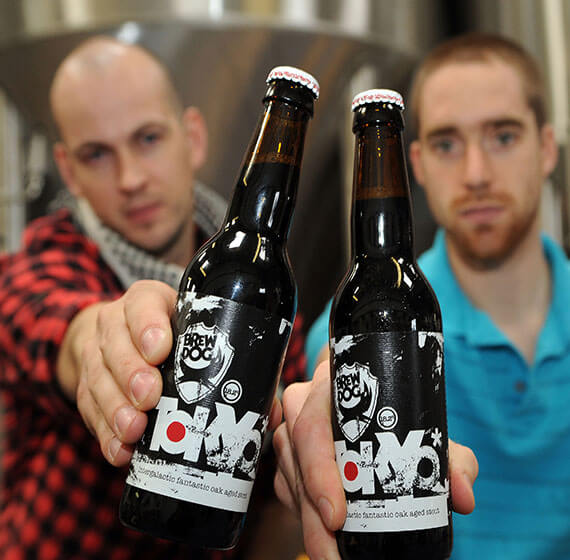History
BrewDog was born out of founders Martin and James’ boredom with the UK beer market. In April 2007, both just 24 at the time, they opened BrewDog in Fraserburgh, Scotland and embarked on their mission to make others as passionate about great craft beer as they are. In 2008 they stopped bottling by hand and made headlines with the UK’s strongest ever beer. When it was banned by The Portman Group, BrewDog began exporting to Sweden, Japan, and America, and in their second year of operation became Scotland’s largest independent brewery.
The growth didn’t stop there. In 2009 the firm launch a round of crowdsourced funding called Equity for Punks which gave people the opportunity to buy shares in BrewDog online. Their anti-business business model raised $975,000 from approximately 1,330 investors that year. The business grew 200% in both 2009 and 2011, and they’ve won a slew of awards for their beer and their business.
In 2017 the firm took on the U.S. market with the launch of its BrewDog Columbus brewery, and has since opened bars in Cincinnati, Indianapolis, Pittsburgh, and several in Columbus including the first ever beer hotel. BrewDog generated $300 Million in revenue in 2019, with $28 million coming from the U.S. business. This year, they opened a funding round targeting $7.5 Million which they hit before November. Today, they’re focused on sustainability in addition to great beer, becoming the world’s first carbon negative brewery.

Standing Out in a Mature Market
Measured in revenue BrewDog is the world’s largest independent craft brewer, and it was deliberate in its decision to enter the U.S. craft beer scene, the largest and most mature market at approximately 30 years ahead of the rest of the world. The company had some brand awareness in the market prior to entering with 100+ bars around the world, six of which are now in the United States. Because of the maturity of the market, BrewDog operates, plans, and communicates differently in the U.S., focusing on what makes BrewDog unique over explaining the value of craft beer to already-savvy consumers.
While still relatively small in the United States, BrewDog recognizes this market represents its greatest opportunity moving forward, and operating out of the Columbus, OH has allowed the firm to protect the quality of its product through faster distribution. They focus on amazing craft beer and cultivating great experiences both in their bars and in the communities in which they operate. The BrewDog crowd equity funding model is a large part of what makes the business and culture what it is. “They’re evangelists and advocates for the business and it allows us to bring people in to be part of what we do, and that’s a really special part of who we are,” explained Jason Block, CEO of BrewDog USA and alumnus of The Ohio State University.
Brewing Culture
The firm considers itself a scrappy competitor with employees who have a propensity for action. They’re team-oriented but operate as a meritocracy that expects excellence while encouraging trying new things, making mistakes, and learning quickly from them to move on to the next idea. When recruiting talent, Block shared that they look for people who embody the irreverence of the brand, who like to have fun, and know how to work hard. Being in the beer industry and having this kind of culture has served the firm well in recruiting, both in quality and quantity of applicants when there are open positions. One of their biggest learnings in the transition to Middle Market player has been to focus heavily on bringing in the right people that can succeed within the culture and pace of BrewDog’s operations.
That focus on culture has been renewed in both recruiting and development of current employees during the trying times of 2020. Utilizing a company-wide platform called Huddle, the team shares frequent video updates that allow them to stay up to speed and connected to each other. They’ve also started a mentorship program for team members who can read leaders’ bios and readily access various mentorship opportunities. These programs are complimentary to a clear review process that helps employees track toward goals and agree upon areas for improvement in addition to specified success metrics tied to incentives and compensation.

Dealing with Uncertainty and Planning for the Future
The uncertainty of 2020 has been difficult for many Middle Market firms, and BrewDog is no exception. As an owner and operator of bars and hotels there’s no shortage of changes. The BrewDog DogHouse Hotel is having its best month ever in November 2020 with a very different customer base than it’s had in the past, but it’s been a challenge to plan for the future not knowing when and if things will return to what they were prior to COVID-19. The firm had already invested in ecommerce initiatives prior to the pandemic and it’s paid off. Ecommerce performance is up 600% in the U.S., and BrewDog plans to double down on some other strategic bets for its future.
As a company committed to hospitality and unique experiences, they’re making investments now for the future return of customers eager to share meaningful connection by disconnecting from their devices. Some of their plans will take 12 months or more to execute, so BrewDog will be well positioned to provide those meaningful experiences when customers can safely return. One of the strategic bets may well be placed in non-alcoholic beer, which is growing at a fast pace among a expanding population of health-conscious consumers.
Block encourages other middle market executives to embrace tenacity and never give up, continuing to fight through the challenges they face today and those they’ll face in the future. He credits much of the company’s success to its ability to tap into the ideas of the entire team to see where they can improve, recognizing that good ideas can come from anywhere in the organization. Highlighted but not caused by COVID, Block also commented that it is increasingly important to diversify where possible to protect your company from the fast pace of changing consumer behaviors.
